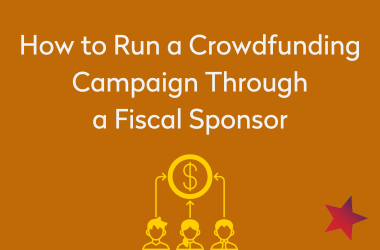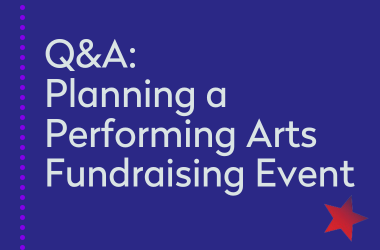What is Fiscal Sponsorship?
Definition of Fiscal Sponsorship in the Performing Arts
Fiscal sponsorship is a relationship in which a nonprofit organization (the fiscal sponsor) agrees to accept and manage funds on behalf of another organization or individual project (the sponsored project). These organizations, which are often performing arts organizations, may not have their own nonprofit status or the capacity to manage their own funds.
Depending on the comprehensiveness of the relationship, a fiscal sponsor can provide a performing arts entity administrative support, financial management, and oversight for the sponsored project, while allowing the entity to focus on its mission and programming. This arrangement allows the sponsored project to benefit from the fiscal sponsor’s tax-exempt status, which means that donations made to the sponsored entity or project are tax-deductible to the extent allowed by law.
Fiscal sponsorship can be a beneficial alternative for performing arts individuals or groups who may not have the resources, expertise, or desire to establish and manage their own nonprofit organization, but still need support to pursue their charitable or social objectives. It can also be an effective way for established nonprofits in the performing arts to incubate new initiatives or collaborate with other organizations on specific projects.
Most Common Benefits of Fiscal Sponsorship in the Performing Arts
Tax-Deductible Donations
Donations made to a sponsored project are tax-deductible to the extent allowed by law. This can make it easier for artists to fundraise and attract donors. When a donor makes a tax-deductible donation to a qualified nonprofit or fiscally sponsored organization, the amount of the donation is subtracted from the donor’s taxable income for that year. This ability to offset taxable income with donations is a major benefit for the donor and can encourage more people to give. For example, if someone donates $1,000 to a fiscally sponsored artist who can receive 100% tax-deductible donations, that donor is able to subtract $1,000 from the income they claim they received when filing taxes. This decreases the amount they owe back to the IRS and may lower their tax bracket.
Access to Grants
Many grants and funding opportunities require applicants to be a nonprofit organization. With a fiscal sponsor, artists can access these opportunities even if they do not have their own nonprofit status. However, it is important to note that proper 501(c)3 incorporation is often required for federal grants such as the National Endowment for the Arts, and grant guidelines should always be reviewed to ensure fiscally sponsored entities are eligible.
Discounted Studio Rental Fees
Many studio rental spaces offer discounted hourly rental rates for non-profit or fiscally sponsored renters, often listed as “NPO rate”. If this rate isn’t clearly listed on the studio’s website, try calling and asking if they offer a discount for non-profits. Spaces that do have NPO rates may ask for your Fiscal Sponsorship Letter of Agreement as proof of incorporation. Learn more here.
Credibility
Being associated with a reputable fiscal sponsor can lend credibility to an artist or arts organization and increase visibility and perceived legitimacy in the arts community.
Administrative Support
Depending on their comprehensiveness, fiscal sponsors can sometimes provide administrative support, including bookkeeping, financial reporting, and legal compliance. This can free up artists’ time and resources to focus on their creative work.
Shared Resources
Fiscal sponsors may offer additional resources and services such as monthly grant opportunity listings, networking opportunities, and access to professional development resources.
Next Steps:
Are you based in NYC and looking for a fiscal sponsor? Browse this list.
Need help determining who to choose as your fiscal sponsor? Check out these tips.
Do you have a fiscal sponsor but aren’t sure how to best utilize them? Here are some ideas.
Related Resources
History of Fiscal Sponsorship
History of Fiscal SponsorshipWhere does Fiscal Sponsorship in the United States Come From? Fiscal sponsorship, the practice of one nonprofit organization providing administrative and financial support to another organization or project that lacks 501(c)(3) status, has...
Running a Crowdfunding Campaign Through a Fiscal Sponsor
Running a Crowdfunding Campaign Through a Fiscal SponsorRunning a crowdfunding campaign through a fiscal sponsor can be a great way to raise funds for your project. Being able to provide tax deductibility to your campaign contributors can be the factor that pushes...
Fundraising Q&A: Planning a Fundraising Event
Q&A: Planning a Performing Arts Fundraising EventEvent Fundraising in the Performing Arts can be a Great Way to Raise Funds There are a number of ways to fundraise money for a performing arts organization or cause. One of the most collaborative ways to fundraise...



